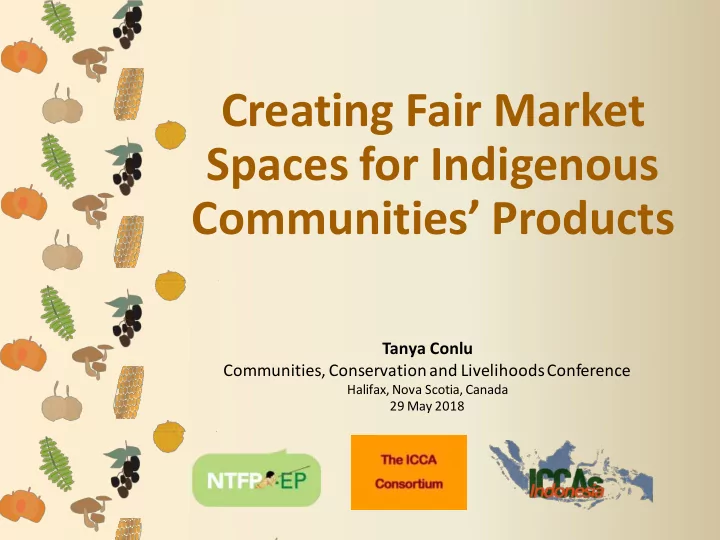

Creating Fair Market Spaces for Indigenous Communities’ Products Tanya Conlu Communities, Conservation and Livelihoods Conference Halifax, Nova Scotia, Canada 29 May 2018
A collaborative network of NGOs and CBOs in Asia working towards strengthening the capacity of forest- dependent communities to sustainably manage their natural resources Works primarily in the Philippines, Indonesia, Malaysia, India, Cambodia and Vietnam, with networks in other Asian countries
MISSION To promote the appropriate recognition of ICCAs, and give appropriate support to them • international association with 121 members which are organizations and federations of indigenous peoples’ and local communities, and civil society groups that work closely with them • 275 honorary individual members • rooted in the movements that promoted equity in conservation, and the international policy recognition of ICCAs • pushes for international recognition of ICCAs as an effective conservation system
SEA EAsia Regi gional al Lear arning g Netwo work a collaboration started in 2015 that provides avenues for mutual learning and exchanges towards enhanced awareness and capacities to recognize and support ICCAs in the region
I ndigenous Peoples’ and Local C ommunities’ C onserved Territories and A reas (ICCA) Successful examples of collective decision-making about nature ... the oldest form of ‘conservation’ on earth… closely related to peoples’ livelihoods, culture and identity Found everywhere, span all types of ecosystems and cultures, have thousands of local names and are extremely diverse
Natural and modified ecosystems including significant biodiversity, ecological services and cultural values voluntarily conserved by indigenous peoples and local communities through customary laws or other effective means
Issu sues s and Challenge ges s for r Livelihoods s in ICCAs • Lack of connectivity to players in the value chain - limited access and interaction with consumers and markets • Lack of business know-how, access to capital, information, quality control practice, compliance to standards, and appropriate technology and markets • Debt trap with local traders/financiers
Issu sues s and Challenge ges s for r Livelihoods s in ICCAs • Permitting processes and other restrictive policies which are exclusive of indigenous communities • Government subsidies to and promotion of less eco-friendly livelihood options • Commercialization of forest products may lead to disregard for traditional practices and regulations • Mainly project-based business development support
Fa Factors tha hat make Com ommu muni nity-based ent nterprises wor ork • Harvesting practices that promote ecosystem integrity and preserve biodiversity • Security of tenure and integration of enterprise in community forestry programs • Strong leadership and ownership, with benefit sharing mechanisms
Fa Factors tha hat make Com ommu muni nity-based ent nterprises wor ork • Products that uphold traditional governance and restore timeless traditions • Intermediaries that provide technical and market support, and promote fair, equitable, and sustainable principles
e Thank you! Merci! For more information about NTFP- EP, get in touch via: www.ntfp.org facebook.com/ntfpep @ntfp_ep info@ntfp.org Photos courtesy of the ICCA Consortium, Grazia Borrini-Feyerabend, Tanya Conlu, NTFP-EP staff , Borneo Chic, Keystone Foundation
Recommend
More recommend